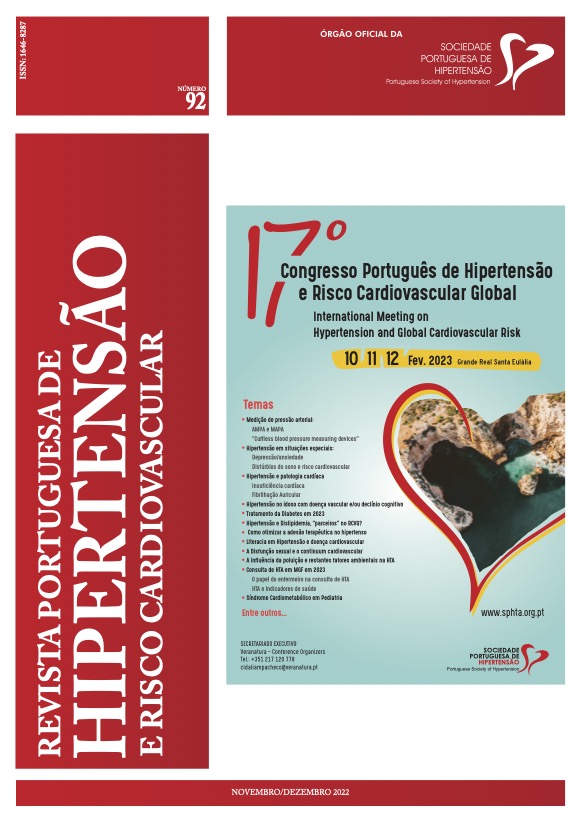THIAZIDE DIURETICS AND SKIN CANCER – A REAL RISK?
DOI:
https://doi.org/10.58043/rphrc.60Abstract
Introduction: Thiazide diuretics are first-line drugs in the treatment of arterial hypertension. Due to its photosensitizing properties, it remains unclear whether its prolonged use increases the risk of skin cancer.
Aim: To evaluate the possible association between the use of thiazide diuretics and the diagnosis of skin cancer.
Methodology: Research in major online medical databases, with MeSH terms “thiazide diuretics” AND “skin cancer”, with no population restrictions except medication with thiazide diuretics. The comparator was the absence of thiazide/ administration of placebo/other antihypertensive and the outcome was of skin cancer.
Results: 13 articles were included – 3 retrospective cohorts, 1 prospective cohort, 6 case-control studies and 3 meta-analyses. 9 studies reported an association between the use of thiazides and the development of skin cancer, namely melanoma, squamous cell carcinoma and basal cell carcinoma. Several authors report a clear dose-response relationship between the use of hydrochlorothiazide and the incidence of basal and squamous cell carcinoma. The remaining studies do not support this relationship remaining a controversial issue.
Conclusion: These results should be analyzed carefully, since, although there is a statistically significant relationship between the risk of developing skin cancer and the administration of thiazide diuretics, this risk is low, so these drugs should not be discontinued when their antihypertensive benefit is evident and greater than the potential risk.
Downloads
References
– WHO World Health Day 2013 - Hypertension. A Glob Br Hypertens. 2013;9.
- Pereira JAR. Hypertension Prevalence in Portugal: systematic review and meta-analysis of population- based Studies on 21st Century. 2018;
- Beaney T, Burrell LM, Castillo RR, Charchar FJ, Cro S, et al. May Measurement Month 2018: a pragmatic global screening campaign to raise awareness of blood pressure by the International Society of Hypertension. Eur Heart J. 2019;1–12.
- 2018 ESC/ESH Clinical Practice Guidelines for the Management of Arterial Hypertension, European Heart Journal:34;2159–2219
- Gandini S, Palli D, Spadola G, et al. Anti-hypertensive drugs and skin cancer risk: a review of the literature and meta-analysis. Critical Reviews in Oncology / Hematology 122. 2018; 1–9
- Nardone B, Majewski, Kim A, et al. Melanoma and Non-Melanoma Skin Cancer Associated with Angiotensin-Converting-Enzyme Inhibitors, Angiotensin- Receptor Blockers and Thiazides: A Matched Cohort Study. Drug Safety. 2016; doi:10.1007/ s40264-016-0487-9
- Shin D, Lee ES, Kim J, Guerra L,Naik D, Prida X. Association Between the Use of Thiazide Diuretics
and the Risk of Skin Cancers: A Meta-Analysis of Observational Studies. J Clin Med Res. 2019;11(4):247- 255
- Pedersen SA, Gaist D, Schmidt SAJ, Hölmich LR, Friis S, Pottegard A. Hydrochlorothiazide use and risk of nonmelanoma skin cancer: A nationwide case-control study from Denmark. J AM ACAD DERMATOL. 2018; 673-681
- Schmidt SAJ, Schmidt M, Mehnert F, Lemeshow S, Sørensen HT. Use of antihypertensive drugs and risk of skin cancer. JEADV. 2015; 29, 1545–1554
- De Vries E, M. Trakatelli, D. Kalabalikis, et al. Known and potential new risk factors for skin cancer in European populations: a multicentre case–control study. British Journal of Dermatology. 2012; 167 (Suppl. 2), pp1–13
- Kaae J, Boyd HA, Hansen AV, Wulf HC, Wohlfahrt J, Melbye M. Photosensitizing Medication Use and Risk of Skin Cancer. Cancer Epidemiology, Biomarkers & Prevention. 2010; 2942:2950
- Pottegard A, Hallas J, Olesen M, et al. Hydrochlorothiazide use is strongly associated with risk of lip cancer. Journal of Internal Medicine, 2017, 282; 322–331
- Westerdahl J, Olsson H, Masback A,Ingvar C,Jonsson N. Risk of malignant melanoma in relation to drug intake, alcohol, smoking and hormonal factos. British Journal of Cancer (1996) 73, 1126-1131
- Pottegard A. Association of Hydrochlorothiazide Use and Risk of Malignant Melanoma - RESEARCH LETTER. JAMA Internal Medicine. 2018; Vol 178, Number 8
- Ruiter R, Visser LE, Eijgelsheim M, et al. High- ceiling diuretics are associated with an increased risk of basal cell carcinoma in a population-based follow-up study. European Journal of Cancer. 2010; 46:2467-2472
- Su K, Habel LA, Achacoso NS, Friedman GD, Asgari MM. Photosensitizing Antihypertensive Drug Use and Risk of Cutaneous Squamous Cell Carcinoma. doi: 10.1111/bjd.16713
- Sousa JP, Puga L, Lopes J, Saleiro C, Lourenço C, Gonçalves L. Thiazides and skin cancer risk: should we be worried?. European Heart Journal. Vol 40, Issue Supplement ehz748.0349. https:doi.org/10.1093/ eurheartj/ehz748.0349





